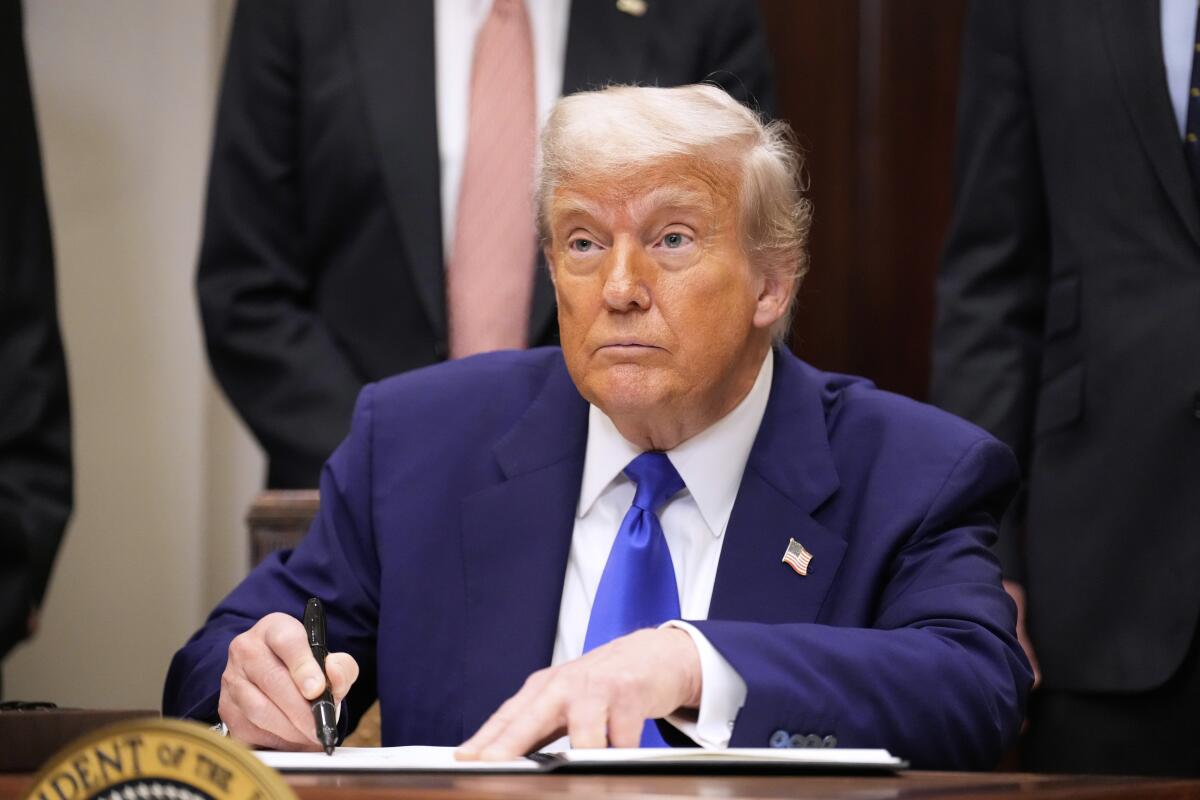The White House on Monday, May 12, 2025, announced an assertive new drug pricing policy aimed at reining in pharmaceutical companies and significantly lowering prescription medication costs for Americans.
President Donald Trump sharply criticized the current drug pricing model.
He called it a form of “redistribution” that allows pharmaceutical firms to take advantage of U.S. consumers.
At a Monday press conference, Trump signed an executive order intended to align domestic drug prices with the lower rates seen overseas.
“We are essentially footing the bill for the world’s healthcare,” Trump said.
He was flanked by Health and Human Services Secretary Robert F. Kennedy Jr. and Centers for Medicare and Medicaid Services Administrator Mehmet Oz.
“They pay a fraction of what we pay,” he added.
Trump highlighted a stark disparity in profits, pointing out that while the U.S. population represents only 4% of the global total, pharmaceutical firms derive more than two-thirds of their profits from the American market.
“That’s not a good thing,” he emphasized.
On Truth Social earlier that day, Trump said the executive order would reduce prescription and pharmaceutical prices in the U.S. “almost immediately.”
He claimed reductions of “30% to 80%” were possible.
He gave specific examples, noting that a breast cancer drug priced at $16,000 in the U.S. costs just $1,600 in Australia.
Similarly, the diabetes and weight-loss drug Ozempic is reportedly ten times more expensive in America compared to other developed nations.
“We’re no longer paying 10 times more than another country,” Trump added.
The initiative, named the “most favored nation” policy, would compel drug manufacturers to align U.S. prices with the lowest rates globally, thereby ending what Trump characterized as entrenched overpricing.
The approach aims to rebalance the international pharmaceutical market, with Trump suggesting that Europe would pay “a little bit more,” while Americans would pay “a lot less.”
Robert F. Kennedy Jr. voiced strong support for the policy during the press briefing, stating that even progressives should welcome it.
“I have a couple of kids who are Democrats or big Bernie Sanders fans,” Kennedy said.
“When I told them this was happening, they had tears in their eyes.
“They didn’t think they’d see this in their lifetime,” he added.
During the closing months of his first term, the Trump administration attempted to implement a similar “most favored nation” rule.
It proposed that Medicare reimbursements for 50 key drugs be pegged to the lowest international prices.
However, a federal judge blocked that move, citing a lack of required public consultation under U.S. law.
The Biden administration later repealed the measure under pressure from drugmakers and hospitals.
Trump’s new order is expected to face substantial pushback from the pharmaceutical industry.
Drug manufacturers argue that such a policy could limit Medicare patients’ access to critical treatments.
The announcement immediately impacted global markets. Pharmaceutical shares in Europe and Asia fell sharply during Monday’s early trading but rebounded somewhat by the market’s close.
In the UK, AstraZeneca’s stock rose by 0.3%, while GSK ended the day up 1.6%.
Meanwhile, shares in U.S. drug companies climbed, buoyed by signs of improving trade relations between the U.S. and China.
One executive at a major pharmaceutical firm described the policy as the industry’s biggest “existential threat” to date and warned that it could undermine innovation in the U.S. biosciences sector.
Still, many health policy analysts have come out in favor of the proposal.
According to NBC News, experts argue that drug companies should be required to match the prices they offer to other nations.
However, they remain skeptical about the plan’s survival, anticipating new legal battles that could derail it.
A 2022 study by the Rand Corporation found that the U.S. paid 2.7 times more for all prescription drugs than other high-income nations, and 3.2 times more specifically for brand-name medications.
Other wealthy countries manage to keep prices lower by negotiating directly with drug manufacturers.
Their systems of universal healthcare give governments more bargaining power as gatekeepers to large patient populations.
Pharmaceutical firms have long justified higher U.S. prices by claiming they fund research and development.
Trump dismissed this rationale during his remarks, calling it one of the “greatest cons” ever.
“They did an amazing job convincing people this was a fair system,” he said.
As of now, the U.S. Department of Health and Human Services has not issued a comment on the executive order.







